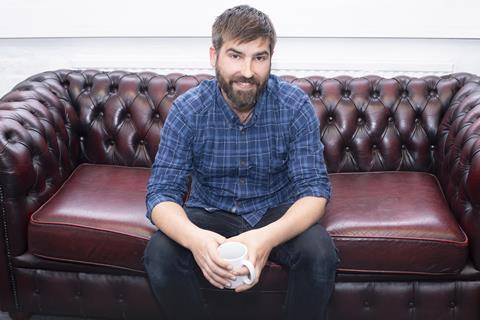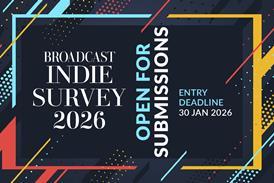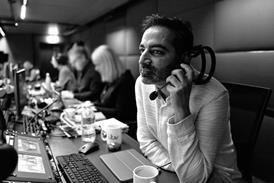Not enough action is being taken to improve the mental health of post house talent, says Zeb Chadfield

65% of people in the UK have experienced a mental health problem at work. Let that sink in for a moment – that’s the majority of the people you’ve ever worked with.
And if you happen to be in the UK film and television industry, it gets a whole lot worse. The proportion of off-screen professionals who’ve experienced a mental health problem at work rises to crisis levels, at almost 90% (according to a survey by filmtvcharity.org.uk).
So why are people in this industry so much more likely to suffer from bad mental health than the general population?
In my experience, the long hours that are treated as normal are a big factor. Early in my career, I worked at post facilities where we were squeezing two to three-day jobs into a single day.
Like most people in the business, I felt pressure to prove myself – I am dyslexic, not well educated and didn’t come from a family in the industry, so I always felt like I needed to show I deserved to be there as much as anyone else.
“Working long hours is a management and planning problem, not a badge of honour.”
I began constantly working extremely long hours to keep up with the workload, which it seemed to be impossible to get on top of. Then, I had a mental breakdown.
As I began to recover, I spent a lot more time thinking about how to change the status quo. I realised that people in post-production regularly sat around the pub telling war stories and treating these conditions as unavoidable. But we’re not going to war and it doesn’t have to be like this. I knew this needed to change.
That’s when I decided to set up my own company, The Finish Line, in 2011. Ever since, I’ve made it a personal goal to ensure that nobody who works for me ever has to go through what I did. I did this in several ways.
To start with, I focused on superficial things like having faster systems and better tools. These allowed us to work more efficiently, but most creative jobs will expand to use any time available – so while we’d have more hours to polish shots, that didn’t necessarily translate to more rest or personal time.
Naturally, I started thinking about how to include more rest hours. It struck me as weird that work was typically quoted as long days rather than shorter days. So rather than have work condensed into 10 or 12 hours, we made the decision to quote 8-hour days as standard instead.
This is a win-win for any post-production house. It’s been proven again and again that more rest can boost creativity. Not only that, it’s been proven that giving people the space to build relationships and hobbies outside of work will do wonders for their mental health.
Of course, the nature of some projects means that overtime is unavoidable. But keeping our hours under control normally means it might stretch to nine hours a day, not 11 or more.
When overtime is needed, it’s important that recovery time is booked too.
We also provide a company account for travel and food if anyone works beyond the standard hours to make sure at the very least, they eat and get home safely.
Working long hours is seen as a management and planning problem, not a badge of honour.
I’m a huge believer in trusting your staff to structure their work hours to fit in with their lives. If you have a school drop-off in the morning or need to leave for a doctor’s appointment early in the afternoon, you’re absolutely free to. Having unlimited holiday also means there doesn’t need to be any concern around booking time off for important events.
I’ve also established an open-door policy where anyone can come talk to me if they have any concern. I call a different member of the team each day to check in and see how they are doing and if we are doing all we can to look after them. Finally, we also set aside one day every three weeks for staff training. This could be anything from an online course to shadowing someone else at the company to learn their skills but can also be used to rest and decompress when that is needed.
At first, there was a bit of pushback from clients about some of these policies. But again, all I do is politely let prospective clients know that the mental health and wellbeing of our staff is more important than any one job – we’re playing a long game here.
“Building mental health support into my company is the best thing I’ve ever done.”
Of course, changing your company and pushing back against industry norms is easier said than done. But to other leaders in this industry, I want to offer words of reassurance – building mental health support into my company is the best thing I’ve ever done. We’ve doubled in size every year, and now deliver regular work for the world’s biggest broadcasters.
It should come as no surprise that the quality of the work we deliver constantly blows me and our clients away. This is because we’ve been able to recruit some amazingly talented staff. Because we’ve put our team and their wellbeing at the heart of everything we do, it’s easy to attract top talent and keep them – we have incredibly low turnover rates.
When I started the Finish Line, I hoped that it was possible to survive in the post-production world by prioritising mental wellbeing. The last decade has proved that not only can a post-production facility like mine survive, but it can thrive.
“I want these standards to become the industry norm.”
Now I’ve shown it works, I’m not trying to protect my ‘secret’ – I want these standards to become the industry norm. After the pandemic, I hope we’ll all have learned to see things with a new perspective, and reconsider what it means to care about your team.
Zeb Chadfield is founder of post-production facility, The Finish Line.





























No comments yet